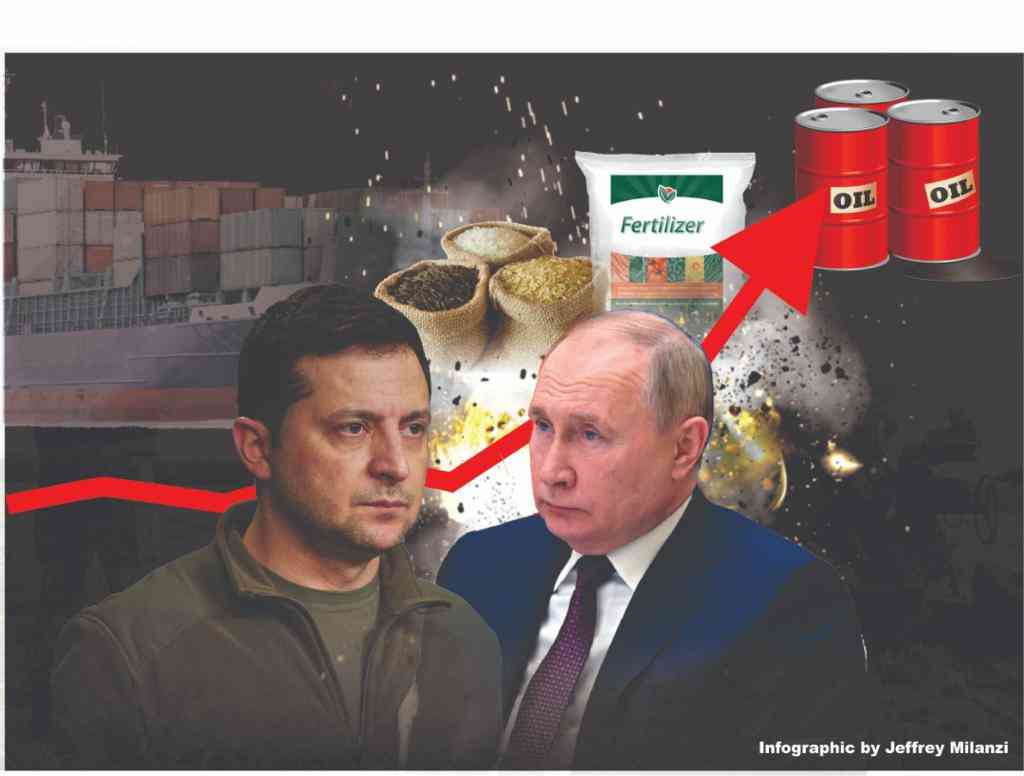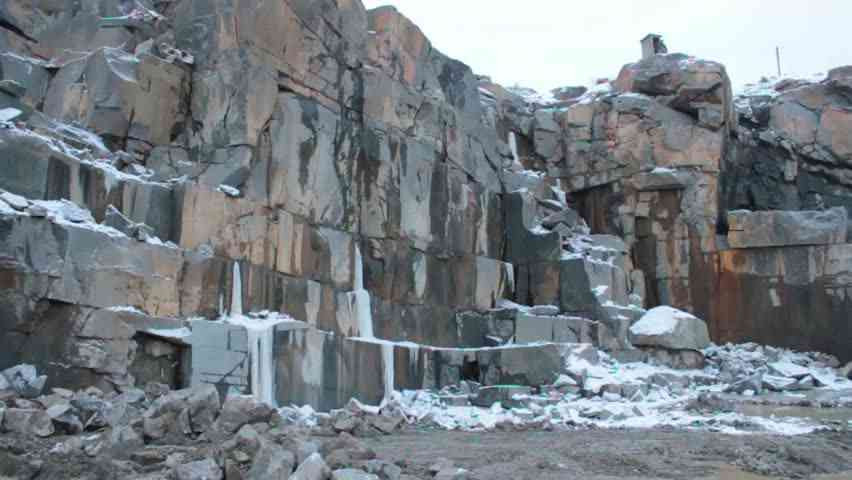
ABOUT nine months since Russia’s full-scale invasion of Ukraine, there has been a turning point in Zimbabwe’s recovery prospects.
It is a phenomenon being experienced across the Southern African region.
Dislocations to long-established international supply chains that have seen freightliners stuck at strategic global ports for long have hit the shipment of vital inputs, like fertiliser and agricultural chemicals.
The growth of agriculture has been held back.
But it is the backbone of the country’s economy, which contributes 20% to the country’s gross domestic product.
The effect of limited cargo liners has not only dealt a blow to quantities to be shipped, but pushed transportation costs up.
According to the Financial Times, costs for shipping a container through international routes rose to US$24 000 at the height of the pandemic, continuing at those levels when the Russia/Ukraine conflict broke out in February.
There have been signs these costs had begun to decrease, but protracted increases on the prices of other services like oil, which have also pushed global inflation up, still present hurdles for countries like Zimbabwe.
- Lukaku becomes the most expensive player ever
- Lukaku becomes the most expensive player ever
- Ukraine's Zelenskiy warns Europeans to brace for bleak winter
- Ben Stiller and Sean Penn latest Americans banned from Russia
Keep Reading
Even before the pandemic and war exploded, the costs of doing business had always been unsustainable in Zimbabwe, propelled by one of the world’s highest inflation rates and a depreciating currency.
The impact of the war, which started with Russia’s attack on Ukraine, has exerted fresh pain on industries and consumers.
Several researches, corroborated this week by Zimbabwean business leaders’ views, have demonstrated how agro-industries have been overstretched.
In interviews with the Zimbabwe Independent, the business leaders and economists chronicled how fuel, food and fertilisers — the three Fs — have inflicted pain on Zimbabwe’s economy thousands of kilometres from conflict zones.
Local economist Victor Bhoroma said: “The war has a negative impact on trade due to disruptions to traditional trade routes for grain, sunflower oil and wheat.
“Thus, it caused some delays in the initial phases. The war has also squeezed global supplies for oil, chemicals, gas, wheat, soya and other commodities. This is driving commodity prices up, which means the cost of importing raw materialso has gone up.”
The government says during the upcoming peak season (January-March 2023) an estimated 3,8 million people will face acute food insecurity — a deterioration of 29,8% compared to last year.
This figure is likely to rise further, due to the currency volatilities and persistent macro-economic challenges.
The Zimbabwe dollar had lost 70% of its value by the end of September this year.
It could depreciate further on the parallel market as the festive season start, according to experts, who projected higher demand for foreign currency.
The World Food Programme (WFP) estimates the deteriorating food security situation due to the war could affect 10 million people in Southern Africa.
According to Reliefweb: “Despite governments attempting to curb soaring food and fuel prices through various measures (e.g. fuel subsidies, price ceilings on basic commodities), all monitored countries in the region have seen a year-on-year (y-o-y) increase in the cost of their food baskets ranging between five to 200%.
“As the region is a net importer of cooking oils, all monitored countries have also seen a high y-o-y increase in cooking oil prices (10 – 400%), and nearly all countries have seen a y-o-y increase in cereal prices.
“As of May 2022, the top four countries which saw the highest y-o-y price increases across the three main food commodities (i.e. cereals, pulses and cooking oil) and the food basket were Zimbabwe, Malawi, the Democratic Republic of Congo (DRC) and the Republic of Congo (ROC).
“High global oil prices have led to increased freight rates and high domestic pump prices; comparing pre-crisis rates to current rates, WFP’s ocean freight rates to the region from other regions have seen a 10-40% increase,” it said.
Implications on food security
Zimbabwe National Chamber of Commerce chief executive Christopher Mugaga said the impact of the war has been at three levels — fertilisers, fuel and food.
“The impact and the cost of the war cannot be separated. In other words, when you look at the impact of this war, it also encompasses the cost as part of the impact,” he said.
“Its impact can be shown dominantly at three levels, which we call the three Fs. The first F being at food level, as you know most of the wheat comes from Ukraine and to a certain extent Russia.”
Fuel
Mugaga said: “The second F is on the fuel, knowing full well the contribution of Russia and the whole supply chain, which links it with Ukraine to supply oil to the world. We felt the impact of the war through fuel prices. This is in addition to the excise duty in Zimbabwe, which remains very high”.
Confederation of Zimbabwe Industries president Kurai Matsheza said fuel prices have been going up because of the war.
“The government has been reducing taxes to cushion the full impact. Edible oil shortages and prices have been experienced by Zimbabweans. Fertiliser supplies equally affected. To ensure availability of these, government had to step in within its limited capability to support and cushion the citizens. The full dollar cost of these support measures are with the government authorities,” he said.
Fertilisers
Russia and Ukraine are major suppliers of fertilisers and African countries import a significant portion of their fertilisers from the two countries.
Fertiliser prices have shot up significantly this year, compared to 2021. The spike in fertiliser prices is a major concern because of the effect it has on food prices across Africa.
By the second quarter of 2022, the prices of major fertilisers including di-ammonium phosphate, triple superphosphate, urea and potassium chloride more than doubled from the previous year.
The fertiliser price index shows a more than 100% increase from the first quarter of 2021 to the first quarter of 2022.
Mugaga said: “The third F is fertilisers. You know their contribution to this. If you look at the general trend regarding movement of prices of fertilisers in this country, you will see an ordinary farmer cannot even afford 200kgs of fertiliser, be it the top or underground one which they call D-Compound. So generally, the three levels that we have felt the war are at food level, fuel level and fertilisers”.
Agriculture contributes 17% to gross domestic product in Zimbabwe, according to the Food and Agriculture Organisation.
Matsheza said the impact has been huge on the agro-industry.
“The impact and cost of that war on Zimbabwe as a country and Zimbabwe business, in particular, is huge. Ukraine wheat and edible oil constitute a huge percentage of global supply,” he said.
“Fertiliser and fertiliser components that come from Russia and Ukraine are significant. These productive bases have been decimated or significantly weakened because of the war.
“The global community is bearing the brunt and Zimbabwe is equally affected. With fertiliser supplies being disrupted, farming in Zimbabwe is affected and indeed the whole agro-industry,” Matsheza said.
Zimbabwe economist Chenayi Mutambasere said other commodities affected on the same way include fertilisers “so the agriculture economy’s recovery path continues to be at risk.
“This is also compounded by the impact on crude oil and cooking, which is already highly inflated in Zimbabwe.
“In addition to the impact from specific commodities, Zimbabwe’s import based economy coupled with, persisting high inflation and weak local currency, creates an economy with a disproportional vulnerability to external diseconomy,” she said.
Manager of the Microeconomic, Institutional and Development Impact Division in the Research Department of the African Development Bank Dr. Ousman Gajigo said last month Russia and Ukraine accounted for 37%, 17% and 14% of Africa’s potassium, nitrogen and phosphorus imports respectively in 2019.
“The Ukraine war disrupted industrial activities and logistics in Ukraine. In Russia, meanwhile, Western sanctions imposed after Russia’s invasion also disrupted that country’s fertiliser supplies. Belarus, a significant supplier of potash to Africa, is also under sanctions similar to those slapped on Russia,” he said.
Gajigo said the spike in fertiliser prices was a major concern because of the effect it has on food prices across Africa.
“The Ukraine crisis is likely to have an adverse effect on harvests across the continent later this year. Already, Africa's use of chemical fertiliser is low even when compared to other developing regions in Latin America and South Asia,’ he said.
“A drastic increase in the price of fertilisers is bound to drastically depress its use on the continent even more, with corresponding effect on crop yields.”
Gajigo said with lower domestic supply, increased pressure on local food prices could be expected.
“As a result, food prices have been on a steady rise this year. Part of the increase is the effect of the Ukraine war on the country’s wheat exports, which is being compounded by the high price of fertiliser effect on other wheat producers,” he said.
Diplomatic impact
Mugaga said the war also has a diplomatic impact, where Zimbabwe cannot be seen to be taking sides.
“There is also the diplomatic impact. If you take a position as a country like Zimbabwe to sympathise with Russia in its move into some land of Ukraine, then it is a signal that world will see Zimbabwe as a stubborn nation, which is not even ready to re-engage,” he said.
“From a diplomatic perspective it can somehow stall our efforts to rejoin the Commonwealth and our efforts to re-engage international financial institutions, like the International Monetary Fund, cannot be seen to be taking sides. This affects our re-engagement efforts.”
The cost of the war
Matsheza said the full cost of the war was much more than just its impact on business.
“War is costly to nations. War is disruptive to economic development. War has got a social impact. Lives are lost in a war. War destroys infrastructure. I can go on and on about the negative impact of wars between nations and even people,” he said.
“Therefore as business our view is that whatever conflict existed between Russia and Ukraine, it should have been resolved without resorting to war.
We urge the United Nations to exert its influence to bring this war to end forth with.”










